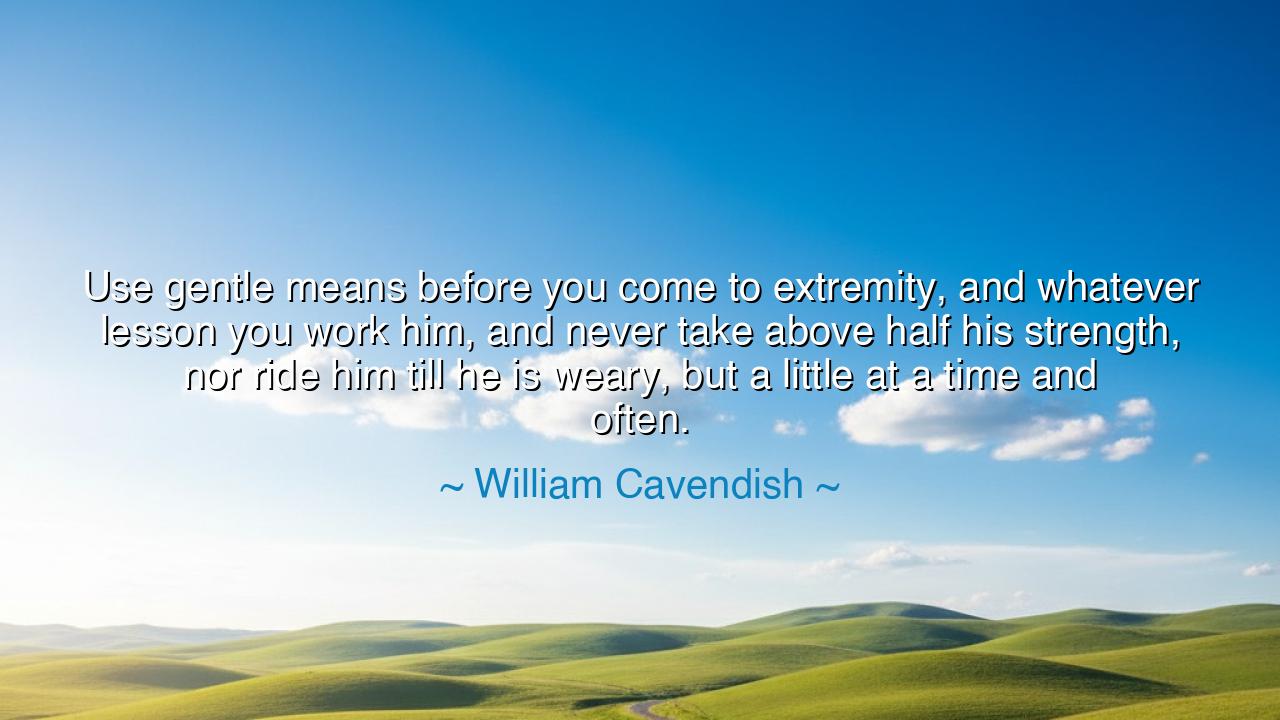
Use gentle means before you come to extremity, and whatever
Use gentle means before you come to extremity, and whatever lesson you work him, and never take above half his strength, nor ride him till he is weary, but a little at a time and often.






Hear the words of William Cavendish, Duke of Newcastle, horseman, philosopher, and nobleman of the seventeenth century, who declared: “Use gentle means before you come to extremity, and whatever lesson you work him, never take above half his strength, nor ride him till he is weary, but a little at a time and often.” Though spoken of the training of horses, this wisdom speaks far beyond the stables, for it is a teaching about the art of guidance, the patience of mastery, and the balance of strength and mercy in all disciplines of life.
The Duke, famed for his horsemanship and his writings on the noble art, understood the heart of the beast he trained. To demand too much, to press to the point of exhaustion, is not to build loyalty or strength, but rebellion and ruin. Gentle means, patience, and repeated lessons cultivate not only obedience but harmony between man and creature. So too with all who guide others—teachers, parents, leaders—the heart is won not by cruelty nor harsh extremity, but by consistency, measured discipline, and respect for the limits of those entrusted to us.
The ancients also knew this truth. In Aristotle’s philosophy of virtue, moderation—never too much, never too little—was the path to excellence. In the East, Confucius taught that the wise ruler governs not through force but by virtue, so that the people follow willingly rather than grudgingly. Cavendish’s counsel to avoid extremity, to press only a little at a time, echoes this universal law: the best way to form strength is through gradual shaping, never by breaking.
Consider the story of Alexander the Great and his famed horse, Bucephalus. When no soldier could tame the animal, Alexander watched closely and perceived that the horse feared only its own shadow. By turning him toward the sun and speaking gently, he won Bucephalus’s trust. That horse would carry him into battle after battle. Alexander succeeded not through extremity, but through gentle means, patience, and understanding. His mastery was born of harmony, not cruelty.
The meaning of Cavendish’s words stretches beyond the horse and rider. In all training—whether of the body, the mind, or the spirit—the principle is the same. Overwork destroys; patience strengthens. To demand all at once is to invite collapse; to demand steadily, “a little at a time and often,” is to cultivate endurance. The greatest teachers, coaches, and mentors through history have known this truth: that real progress is not forced in a single day, but grown like a tree, slow, steady, and lasting.
The lesson for us is profound: treat both others and yourself with patience. When you lead, do not drive to the point of breaking, for broken spirits are of no use, and resentment is the fruit of tyranny. When you train yourself, do not set upon yourself impossible burdens that crush your will, but practice discipline steadily, a little each day, until your strength grows naturally. The path to mastery, in horses and in men, is paved with gentleness, patience, and constancy.
What, then, are the practical actions? In teaching or parenting, guide with kindness first, and firmness only when needed. In your work, pace yourself, lest haste breed exhaustion. In your self-discipline, take on no more than half your strength at once, but return often, making practice a rhythm rather than a burden. Remember that patience is not weakness, and gentleness is not indulgence. They are the builders of strength and the architects of loyalty.
Thus Cavendish’s wisdom endures across centuries: “Use gentle means before you come to extremity; never take above half his strength, nor ride him till he is weary, but a little at a time and often.” Carry this into your life, O seeker, and you will master not only horses, but the art of guiding men, the art of mastering yourself, and the art of building strength that lasts through all seasons.






AAdministratorAdministrator
Welcome, honored guests. Please leave a comment, we will respond soon